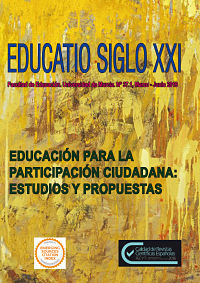The Spanish school management model and its implications in the development of pedagogical leadership in Andalusia. A qualitative study
Abstract
The development of pedagogical leadership in school managers is a key factor for the improvement of students’ learning results. To this end, school managers require a degree of real autonomy regarding the management of pedagogical aspects in their schools. However, in Spain, the exercise of leadership does not imply the full development of its pedagogical dimension. The complexity and the traditionalist inertia of school culture have a negative
impact on these issues. Qualitative and interpretative, the present study has investigated the perspectives of fifteen school principals about their leadership and the possibilities to develop pedagogical leadership. The application of the technique of content analysis resulted in the consolidation of a series of emerging categories that respond to a series of pedagogical leadership capacities. With regard to the interpretative phase, the emergent organisation of its subcategories and the establishment of a categorical frequency index (CFI), as a quantitative ingredient, allowed us to complete the degree of comprehension and specification of the information.
Downloads
-
Abstract4248
-
PDF (Español (España))2866
References
Anderson, S. (2010). Liderazgo directivo: claves para una mejor escuela. Revista Psicoperspectivas, 9(2), 34-52.
Ávila, J. (2013). Por uma Analise de Conteudo Mais Fiavel. Revista Portuguesa de Pedagogía, 47, 7-29.
Beltrán, R., Bolívar, A, Rodríguez-Conde, M., Rodríguez-Diéguez, J. y Sánchez, S. (2004). Evaluación de la función directiva en los centros docentes sostenidos con fondos públicos. Enseñanza, 22, 35-76.
Bolívar, A. (2000). Los centros educativos como organizaciones que aprenden. Madrid: La Muralla.
Bolívar, A. (2010). ¿Cómo un liderazgo pedagógico y distribuido mejora los logros académicos? Revisión de la investigación y propuesta. Magis. Revista Internacional de Investigación en Educación, 5 (julio-diciembre 2010).
Bolívar, A. (2014). Las historias de vida del profesorado. Voces y contextos. Revista Mexicana de Investigación Educativa. 19, 62, 711-734.
Bolívar, A., López-Yañez, J. y Murillo, F.J. (2013). Liderazgo en las instituciones educativas. Una revisión de líneas de investigación. Revista Fuentes, 14, 15-60.
Flick, U. (2007). Introducción a la Investigación Cualitativa. España: Morata.
Hopkins, D., Stringfield, S., Harris, A., Stoll, L., & Mackay, T. (2014). School and system improvement: A narrative state-of-the-art review. School Effectiveness and School Improvement, 25, 257-281
Ko, J., Hallinger, P., & Walker, A. (2015). Exploring whole school versus subject department improvement in Hong Kong secondary schools. School Effectiveness and School Improvement, 26, 215-239
Moral, C. y Amores, F. J. (2014). Arquitectura resistente determinante del liderazgo pedagógico en los centros de Secundaria. Bordón, 66(2), 121-138.
Popkewitz, T. (1988). Paradigmas e Ideología en la Investigación Educativa. Madrid, Mondadori.
Ritacco, M. y Bolívar, A. (2016). Impacto del modelo español de dirección escolar en la identidad profesional los líderes escolares. Archivos Analíticos de Políticas Educativas, 24(119), 1-28.
Ritacco, M., Amores, F., & Moral; C. (2015). El Desarrollo de Procesos de Autoevaluación como Capacidad del Liderazgo Pedagógico. Un Estudio en Educación Secundaria en Andalucía. Revista Iberoamericana de Evaluación Educativa, n. 8, p. 1-20.
Ritacco, M. y Amores, F. (2017). Dirección escolar y liderazgo pedagógico: Un análisis de contenido del discurso de los directores de centros educativos en la Comunidad Autónoma de Andalucía. Educação e Pesquisa, 43, 2 (1-18)
Sammons, P., Davis, S., Day, C., & Gu, Q. (2014). Using mixed methods to investigate school improvement and the role of leadership. Journal of Educational Administration, 52, 565–589
Smith, J.A., Flower, P. y Larkin, M. (2009). Interpretative Phenomenological Analysis: Theory, Method and Research. Londres: Sage.
Strauss, A., & Corbin, J. (2002). Bases de la investigación cualitativa. Técnicas y procedimientos para desarrollar la teoría fundamentada. Antioquia: Universidad de Antioquia, Colombia.
Thoonen, E., Steegers, P., Oort, F., & Peetsma, T. (2012). Building school-wide capacity for improvement: The role of leadership, school organizational conditions, and teacher factors. School Effectiveness and School Improvement, 23, 441–460.10.1080/09243453.2012.678867
Vallés, M. (2009). Entrevistas Cualitativas. Cuadernos Metodológicos. Madrid. CIS.
Viñao, A. (2004). La Dirección Escolar: un análisis genealógico-cultural, Educação, 2 (53), pp. 367 – 415.
Weiss, E. (2017). Hermenéutica y descripción densa versus teoría fundamentada. Revista mexicana de investigación educativa., Vol. 22, núm. 73, pp. 637-654.
Original work publishes in this journal is subject to the following terms:
1. Murcia University Press (the publishing house) holds the copyright of the publishes work, and favours and allows their reutilization under the use license stated in point 2.
© Servicio de Publicaciones, Universidad de Murcia, 2015
2. Work is published in the electronic edition under a license (Creative Commons Reconocimiento-NoComercial-SinObraDerivada 4.0 España (legal text). They can be copied, used, disseminated, transmitted and publicly presented, as long as: i) authorship and original publication source is acknowledged (journal, publishing house and URL of the work); ii) are not used for commercial purposes; iii) the existence and specifications of this use license is stated.
3. Conditions for self-archive. Authors are allowed and encouraged to disseminate electronically the pre-pint (before review) and/or post-print (accepted for publication) versions of their work before their publication since that favours earlier circulation and dissemination resulting in an increased chance for the authors to be cited and for the work to reach a bigger share of the academic community. Colour: RoMEO: green.








